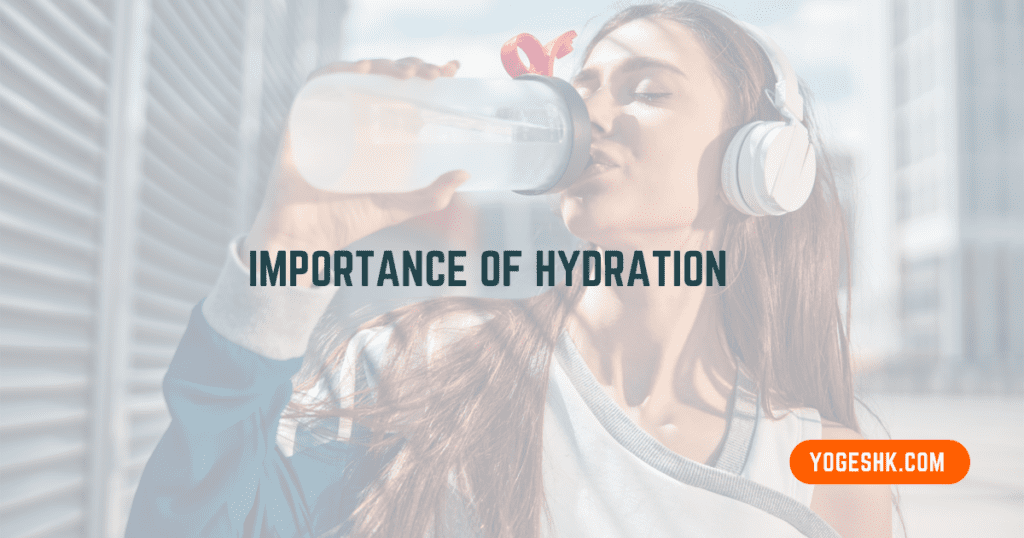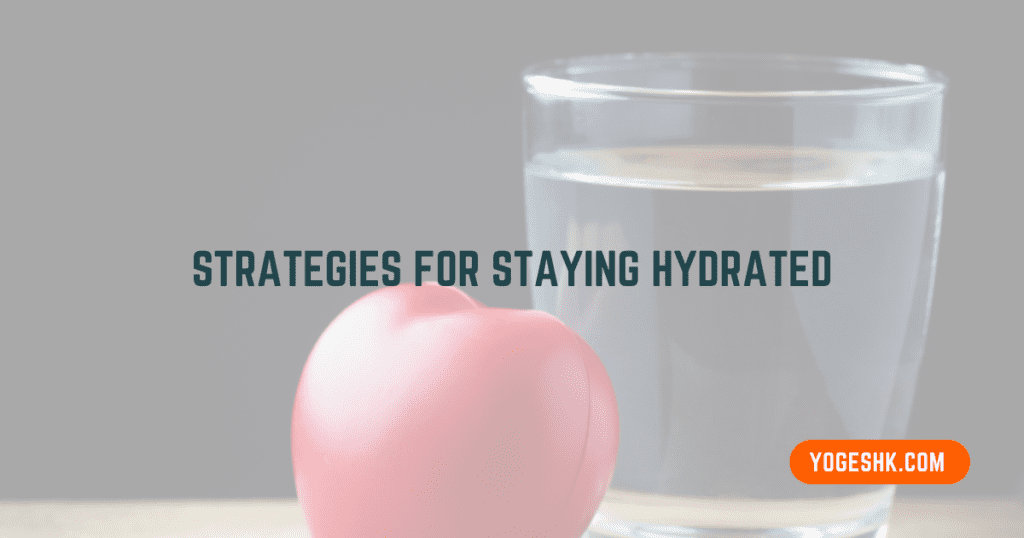
In this article, we will discuss the importance of hydration and some tips and strategies for staying hydrated. Hydration is essential for maintaining bodily functions, improving physical performance, aiding in weight loss, and more. However, many people struggle to drink enough water and can suffer from the consequences of dehydration.
A. Explanation of the importance of hydration: Water makes up about 60% of our body weight, and every cell, tissue, and organ needs it to function correctly. Hydration helps regulate body temperature, flush out toxins, transport nutrients, and lubricate joints. When we don’t drink enough water, our body can suffer from dehydration, which can cause headaches, fatigue, dizziness, and reduced cognitive performance.
B. Brief overview of the article: This article will provide information on how much water we should drink, hydration tips, and strategies for staying hydrated. We will discuss how age, gender, physical activity level, and climate affect our hydration needs and provide suggestions for tracking water intake. Additionally, we will offer hydration tips such as incorporating hydrating foods into your diet, carrying a reusable water bottle, making water more appealing, and limiting dehydrating beverages.
Finally, we will discuss strategies for staying hydrated, including establishing a routine, tracking water intake, and setting an example for others. By the end of this article, readers will better understand the importance of hydration and how to stay hydrated for better health and well-being.
Why is hydration important?

This section will discuss why hydration is vital for our health and well-being.
Benefits of hydration:
- Maintains bodily functions: Water is essential for adequately operating our organs, tissues, and cells. It helps regulate body temperature, flush out toxins, and transport nutrients throughout the body.
- Improves physical performance: Staying hydrated is essential for physical performance as it helps to lubricate our joints, maintain muscle strength and endurance, and prevent muscle cramps.
- Aids in weight loss: Drinking water can help us feel full and reduce our overall calorie intake. It also helps to increase our metabolism, aiding in weight loss.
Consequences of dehydration:
- Headaches: One of the most common symptoms of dehydration is headaches. When we don’t drink enough water, our brains can shrink and pull away from the skull, causing pain and discomfort.
- Fatigue: Dehydration can cause fatigue and feelings of exhaustion. Fatigue is because water helps to transport oxygen and nutrients throughout our body, and when we are dehydrated, our body’s systems slow down.
- Dizziness: When we are dehydrated, our blood volume decreases, which can cause a drop in blood pressure and lead to dizziness or lightheadedness.
- Reduced cognitive performance: Staying hydrated is essential for our brain function, and our mental performance can suffer when dehydrated. Decreased cognitive performance can include difficulties with memory, concentration, and decision-making.
Staying hydrated is crucial for our overall health and well-being, and the consequences of dehydration can be severe. By drinking enough water and staying hydrated, we can reap the many benefits of proper hydration and avoid the adverse effects of dehydration.
How much water should you drink?

This section will provide information on how much water we should drink daily and factors that can affect our hydration needs.
A. Factors affecting hydration needs:
- Age: As we age, our bodies become less efficient at conserving water, and our sense of thirst may decrease. Therefore, older adults may need to drink more water to stay hydrated.
- Gender: Men generally require more water than women due to having a higher percentage of muscle mass and a higher metabolic rate.
- Physical activity level: When we exercise or engage in physical activity, we lose water through sweat, and our hydration needs increase accordingly.
- Climate: Hot and humid environments can increase our water needs as we lose more water through sweat.
B. Recommended daily water intake:
- General guidelines: The general recommendation for daily water intake is 8-8-ounce glasses per day or about 2 liters. However, this can vary depending on the factors listed above.
- Tips for tracking water intake: To ensure you are drinking enough, use a water bottle with measurements or track your water intake using a mobile app.
Overall, understanding how much water you need to drink daily can help you stay hydrated and avoid the negative consequences of dehydration. By considering the factors affecting your hydration needs and tracking your water intake, you can ensure that you meet your body’s water needs.
Hydration Tips

This section will provide several tips for staying hydrated and ensuring that you are meeting your body’s water needs.
A. Incorporate hydrating foods into your diet:
- Fruits and vegetables: Many fruits and vegetables have a high water content, making them an excellent choice for staying hydrated. Some examples include watermelon, cucumber, strawberries, and lettuce.
- Soups and broths: Soups and broths are hydrating and contain essential nutrients supporting overall health and well-being.
B. Carry a reusable water bottle:
- Advantages of using a reusable water bottle: Using a reusable water bottle is eco-friendly and can also help you stay hydrated throughout the day. By carrying a water bottle with you, you can easily refill it and drink it whenever needed.
- Tips for choosing a water bottle: When selecting a water bottle, look for one that is durable, easy to clean, and has a size that works well for you. Many options include stainless steel, glass, and BPA-free plastic.
C. Make water more appealing:
- Infused water: Infusing fruit, herbs, or vegetables can add flavor and make drinking water more enjoyable. Some popular combinations include cucumber and mint, lemon and ginger, or strawberry and basil.
- Electrolyte-enhanced water: Electrolyte-enhanced water contains minerals such as sodium and potassium, which can help replenish electrolytes lost through sweat during exercise.
D. Limit dehydrating beverages:
- Alcohol: Alcohol can dehydrate, so it is essential to limit your intake and drink water alongside alcoholic beverages.
- Caffeinated beverages: While moderate amounts of caffeine are not dehydrating, excessive caffeine intake can lead to dehydration. Balancing your caffeine intake with water intake and listening to your body’s thirst cues is crucial.
You can stay hydrated and support your overall health and well-being by incorporating hydrating foods into your diet, carrying a reusable water bottle, making water more appealing, and limiting dehydrating beverages.
Also, Read The Science Behind Hydration Benefits.
Strategies for Staying Hydrated

This section will provide strategies for establishing and maintaining healthy hydration habits.
A. Establish a routine:
- Drinking water at specific times of day: Incorporating water breaks into your daily routine can help ensure you consistently drink enough water. For example, you might drink a glass of water when you wake up, before meals, or at certain times throughout the day.
- Using reminders: Setting reminders on your phone or computer can also help you remember to drink water throughout the day.
B. Track your water intake:
- Using a journal or app: Tracking your water intake can help you identify patterns and ensure that you are consistently meeting your hydration goals. Use a journal to record your daily water intake or a mobile app that tracks your water consumption.
- Setting specific water intake goals can also motivate you to drink more water. For example, you might aim to drink a certain number of ounces of water per day or increase your water intake by a certain percentage each week.
C. Set an example for others:
- Encouraging family and friends to stay hydrated: Encouraging those around you can help create a culture of healthy hydration habits. Consider drinking water during meals or bringing a water bottle to share with friends and family.
- Being a role model in the workplace: As a role model, you can encourage coworkers to stay hydrated by leading by example. Keep a water bottle at your desk and take daily water breaks.
Establishing a routine, tracking your water intake, and setting an example for others can create healthy hydration habits that support your overall health and well-being.
Conclusion
This section will summarize the main points covered in the article and encourage readers to prioritize hydration for better health and well-being.
A. Recap of hydration tips and strategies: The conclusion will summarize the hydration tips and techniques covered in the article, highlighting the importance of incorporating hydrating foods into your diet, carrying a reusable water bottle, making water more appealing, limiting dehydrating beverages, establishing a hydration routine, tracking water intake, and setting an example for others.
B. Encouragement to prioritize hydration for better health and well-being: The conclusion will emphasize the importance of staying hydrated for overall health and well-being. It will discuss hydration’s benefits, dehydration’s consequences, and how staying hydrated can improve physical and cognitive performance.
C. Call-to-action to share the article with others who may benefit from it: The conclusion will encourage readers to share the report with family, friends, and coworkers who may benefit from the information provided. It will emphasize the importance of spreading the message of healthy hydration habits to help create a culture of wellness and support better health outcomes for all.
